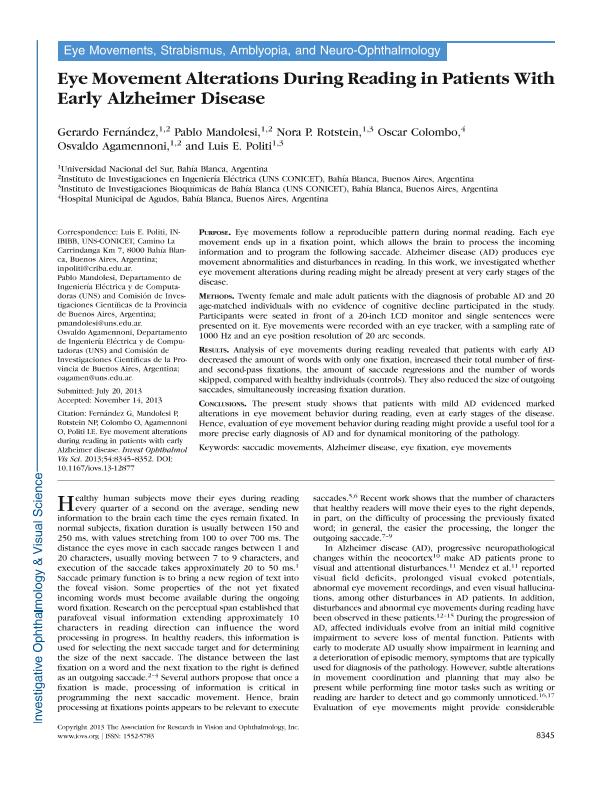Artículo
Eye Movement Alterations During Reading in Patients With Early Alzheimer Disease
Fernández, Gerardo Abel; Mandolesi, Pablo Sergio; Rotstein, Nora Patricia ; Colombo, Oscar; Agamennoni, Osvaldo Enrique; Politi, Luis Enrique
; Colombo, Oscar; Agamennoni, Osvaldo Enrique; Politi, Luis Enrique
 ; Colombo, Oscar; Agamennoni, Osvaldo Enrique; Politi, Luis Enrique
; Colombo, Oscar; Agamennoni, Osvaldo Enrique; Politi, Luis Enrique
Fecha de publicación:
12/2013
Editorial:
Association For Research In Vision And Ophthalmology
Revista:
Investigative Ophthalmology & Visual Science
ISSN:
0146-0404
Idioma:
Inglés
Tipo de recurso:
Artículo publicado
Clasificación temática:
Resumen
Purpose Eye movements follow a reproducible pattern during normal reading. Each eye movement ends up in a fixation point, which allows the brain to process the incoming information and to program the following saccade. Alzheimer disease (AD) produces eye movement abnormalities and disturbances in reading. In this work we investigated whether eye movement alterations during reading might be already present at very early stages of the disease. Methods Twenty female and male adult patients with the diagnosis of probable AD and 20 age-matching individuals with no evidence of cognitive decline participated in the study. Participants were seated in front of a 20-inch LCD monitor and single sentences were presented on it. Eye movements were recorded with an eyetracker, with a sampling rate of 1000 Hz and an eye position resolution of 20-s arc. Results Analysis of eye movements during reading revealed that patients with early AD decreased the amount of words with only one fixations, increased their total number of first and second pass fixations, the amount of saccade regressions and the number of words skipped, compared with healthy individuals (controls). They also reduced the size of outgoing saccades, simultaneously increasing fixation duration. Conclusions The present study shows that patients with mild AD evidenced marked alterations in eye movement behavior during reading, even at early stages of the disease. Hence, evaluation of eye movement behavior during reading might provide a useful tool for a more precise early diagnosis of AD and for dynamical monitoring of the pathology.
Archivos asociados
Licencia
Identificadores
Colecciones
Articulos(CCT - BAHIA BLANCA)
Articulos de CTRO.CIENTIFICO TECNOL.CONICET - BAHIA BLANCA
Articulos de CTRO.CIENTIFICO TECNOL.CONICET - BAHIA BLANCA
Articulos(INIBIBB)
Articulos de INST.DE INVEST.BIOQUIMICAS BAHIA BLANCA (I)
Articulos de INST.DE INVEST.BIOQUIMICAS BAHIA BLANCA (I)
Citación
Fernández, Gerardo Abel; Mandolesi, Pablo Sergio; Rotstein, Nora Patricia; Colombo, Oscar; Agamennoni, Osvaldo Enrique; et al.; Eye Movement Alterations During Reading in Patients With Early Alzheimer Disease; Association For Research In Vision And Ophthalmology; Investigative Ophthalmology & Visual Science; 54; 13; 12-2013; 8345-8352
Compartir
Altmétricas



